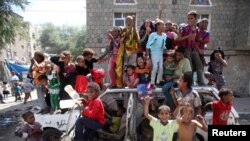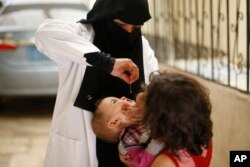The United Nations Children’s Fund warns the political crisis in Yemen is likely to plunge millions of children into deepening poverty. UNICEF says malnutrition rates are likely to increase and education for many children will be disrupted.
Yemen is one of the poorest countries in the world. Before this present political crisis hit, more than 60 percent of the population was living under the poverty line.
The representative for the U.N. Children’s Fund in Yemen, Julien Harneis, says the current tumultuous situation is likely to increase the poverty rate further.
Malnutrition
Speaking by telephone from the capital, Sana'a, the UNICEF official says the country is largely dependent on foreign aid and the political disarray is putting that in danger. With this lifeline gone, he says, the government will not be able to provide health and education services.
“This is particularly worrying for us as it means that we expect an increase in malnutrition and less children going to school," he said. "That is a tragedy because despite all the problems that Yemen has been going over the last years, we have seen improvements. Stunting in the last five years has gone down from almost 70 percent to about 48 percent. We have managed education for girls and boys to get to about 70 percent for primary school.”
Shortage of vaccines
Harneis says these gains are likely to be lost if this situation continues. Currently, he notes about 900,000 children are acutely malnourished and about 210,000 are severely malnourished. He says the biggest worry is that Yemen will run out of vaccines for diseases like polio and tuberculosis.
He says there are enough supplies for now, but it is likely that the vaccine supply chain will be disrupted within the next month to six weeks.
“It is particularly worrying because Yemen is a transit point for populations coming across from the Horn of Africa and moving on to other parts of the region. And that means including places like Somalia. So, we are very concerned because if there is a breakdown in the supply chain and the provision of polio vaccines what that might mean for the return of polio for Yemen,” said Harneis.
UNICEF has treated 160,000 children for acute malnutrition and provided nearly 900,000 people with safe drinking water in Yemen. It also has constructed and refurbished many schools across the country, providing more than one-half million children with a safe learning environment.
The agency is appealing for $60 million to be able to continue its humanitarian operations in Yemen throughout this year.





